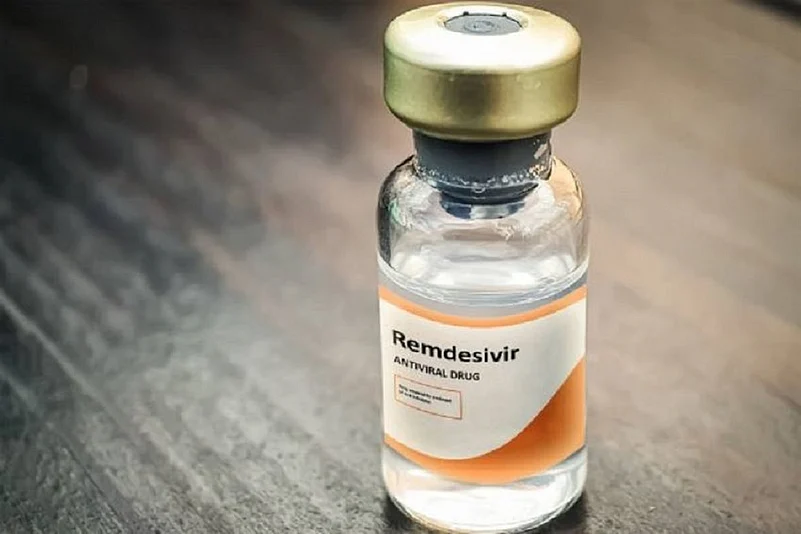Antiviral drug remdesivir, known to reduce the recovery time for covid patients, is being sold in the black markets in Delhi at almost ten times its original cost. The MRP of Remdesivir is Rs 5,400; however, hospitals say that it costs a patient around Rs 7,000 after adding handling and other charges.
Delhi’s top hospitals, speaking to Outlook, complained that the drug is only available in the black market as there is a shortage of supply. “It costs anywhere between Rs 45,000 and Rs 70,000, depending on the urgency of both the buyer and the seller,” a senior oncologist from a top hospital said.
According to distribution norms, companies authorised to manufacture and market the product are supposed to supply it only to hospitals, and not to chemists.
Hetero Labs Ltd is the only company which has manufactured and distributed the drug till date. According to a statement released by Hetero labs on June 21, it received the manufacturing and marketing approval for the investigational antiviral medicine ‘Remdesivir’ from the Drug Controller General of India (DCGI) for the treatment of Covid-19 and its generic version of Remdesivir would be marketed under the brand name ‘COVIFOR’ in India. Till date, the company has roughly supplied 30,000 vials of COVIFOR to various hospitals.
Dr TV Narayana, President, Indian Pharmaceutical Association (IPA) blamed the company’s decision of directly supplying to patients for this crisis.
“People have forged prescriptions and approached the sales executive of the company, who directly supplied the drug to them. Though they maintained the record of the supply to individuals, I believe this is how it has gone in wrong hands,” Narayana said.
Meanwhile, Dr VG Somani, Drugs Controller General of India, has written to state drug controllers and asked them to instruct their enforcement officials “to keep a strict vigil on the matter to prevent black-marketing and sale of Remdesivir above MRP.”
However, Dr Vamsi Krishna Bandi, Managing Director, Hetero Group of Companies said the company has ensured that all the vials of the drug are directly supplied to hospitals. “The major distribution happened in Hyderabad, Mumbai and Delhi. We received advice from the drug control department to give it directly to patients only on compassionate grounds and on emergency basis, with a valid prescription. So, the number of vials given to individuals is very limited,” he said.
He hoped that the supply would be adequate in a couple of weeks as Cipla Ltd has started its manufacturing while Mylan just received an approval last week.
The company has asked all the hospitals to send details of the patients to whom the drug was injected so that it can identify from where it has leaked to the chemists or agents who are black-marketing it.
A company’s sales executive, who is not authorised to speak, said, “From June 29, there is no fresh supply of the medicine. The fresh stock will come by evening of July 9.”
US-based pharmaceutical company, Gilead Sciences, manufactured this medicine and established through clinical trials that it helps speed up recovery of a Covid-19 patient with mild symptoms.
On May 1, while issuing the Emergency Use Authorization (EUA) to remdesivir, the U.S. Food & Drug Administration said, “While there is limited information known about the safety and effectiveness of using remdesivir to treat people in the hospital with COVID-19, the investigational drug was shown in a clinical trial to shorten the time to recovery in some patients.”
In an e-mail interaction, the official spokesperson of Gilead said, “Gilead has signed non-exclusive licensing agreements with nine generic pharmaceutical manufacturers based in Egypt, India and Pakistan to further expand the supply of remdesivir – Cipla Ltd.; Dr. Reddy's Laboratories Ltd.; Eva Pharma; Ferozsons Laboratories; Hetero Labs Ltd.; Jubilant Lifesciences; Mylan; Syngene, a Biocon company; and Zydus Cadila Healthcare Ltd.”
The spokesperson admitted that Gilead has a limited supply of remdesivir for the next three months and are carefully managing allocation while product supply continues to increase.
“We expect this supply to be sufficient to meet current demand in some countries where the pandemic has already peaked, but may not be enough to meet all treatment needs in others,” the spokesperson said.
“We recognize the global scale of this pandemic and are working as quickly as possible to enable access around the world. We expect our global supply will be less constrained by the end of September and that, at currently anticipated rates of infection, our supply in October and beyond will meet real-time global demand,” the spokesperson added.
















